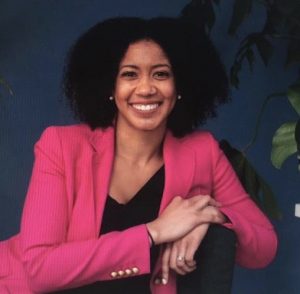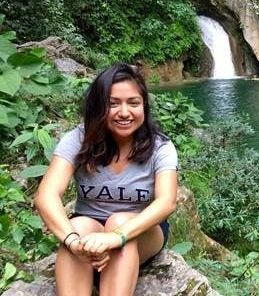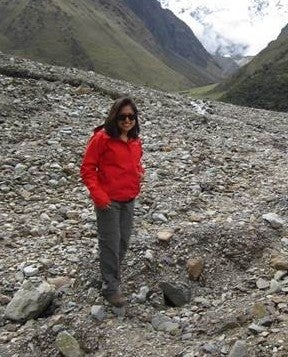This year we have reached Earth Day not only as the country continues to face unimaginable death tolls, but especially as there is an increasing understanding of the ways the coronavirus is compounding existing injustices in our country.
EDF and EDF Action are very fortunate to have recently hired two amazing women, Elise Nelson Leary and Esther Sosa, to lead our engagement work with Latino, African American and other diverse community partners. We recently had a remote conversation with them to reflect on their current work and past experiences with Earth Day and the environmental movement.
“I would never have categorized my family as environmentalists…but that doesn’t mean they don’t care about the earth and its resources”
Question: What were your first memories of Earth Day? Are your families environmentalists?

Elise Nelson Leary
Elise: My first memories of Earth Day, something I saw as a “white” holiday, come from a grade school celebration. I remember it as an outdoor party— we got out of class, there was music, dancing, and we went outside. As a serious child, the message to “love the Earth” didn’t quite resonate with me. I remember being confused, as I had never heard my family talking about this holiday. I would never have categorized my family as environmentalists. We didn’t even recycle (Gasp!).
Even today, my family doesn’t actively celebrate Earth Day, but that doesn’t mean they don’t care about the earth and its resources. When I think about my childhood, I realize my parents always taught me to shut off the lights when I left the room, take short showers to save water and reuse plastic bags.

Elise as a child
That’s been a good lesson with partners and policymakers too: they might be coming from a different place, but the shared values are there. I try to explain our work using the same language I would use to talk to my family and that has made people much more receptive to our work.
Esther: Coming from New York City I did not ever think twice about water, although I vaguely remember my mom giving me a small cup of water to brush my teeth every night. She would say, “no mas agua” I knew that was my ration for the night, but never thought twice about it.

Esther Sosa
However, I quickly understood why when we moved back to the town in Mexico where my parents grew up to care for my sick grandparents. I was five at the time, and water came twice a week; I remember that my job was to wait by the faucet until the water came. I was responsible for alerting everyone when the water arrived. I ran around shouting “The water is here!” this would then lead to a mass coordinated mobilization where everyone had one goal: fill as many buckets as we could before the water shut off. Missing this call meant no water.
This experience truly shaped my relationship with our natural resources and with Mother Earth. I understood that potable water meant survival for communities, my family included.
“I feel a responsibility to advocate for the needs of communities like my own, who often go unheard on environmental issues”
Q: What’s your background? How did you end up in this field? How does your background help the work you do?
Elise: I studied urban renewal policy in school and became interested in climate resilience and its impact on communities while working for local government. I definitely wouldn’t say I’ve always been drawn to environmentalism, though understanding the impact of policy and urban design on community development efforts and their disproportionate impacts on Black communities have long interested me.
I’m also a history enthusiast and I enjoy learning how public policies in our country developed. I saw how my family has directly benefited from policies to help fund education and to buy homes. This makes me believe in the power of smart government policies to address problems.
I like this role because I get to help partners realize pollution policies do impact their constituencies. Politics moves quickly and it’s great to see that EDF, and many other organizations, are realizing that they can reach their goals faster if they make sure they are more inclusive and purposeful in outreach to diverse communities.

Esther on her travels
Esther: After graduating from college, I was curious to see how my experiences fit into a global narrative, so I left the United States to backpack across South America. On this journey I had two goals, to gain greater self-awareness and to explore the environmental challenges that other communities face.
My experience with water scarcity piqued my interest in understanding how other families were experiencing climate change. I lived in a favela in Brazil, trekked up glaciers in Peru visiting and listening to locals along the way, and connected with individuals living in the Atacama Desert in Chile, home to Latin America’s largest solar power plant.
All of these experiences reinforced that the burden of adaptation to drastic and irreversible environmental change falls disproportionately on poor communities. I learned these places halfway across the world were not that different than the community where I grew up. I learned that we share a collective desire to protect our Pachamama and our people.
These experiences brought me to EDF, and while I’m here, I feel a responsibility to advocate for the needs of communities like my own, who often go unheard on environmental issues, but whose survival depends on a healthy planet.
Q: Lastly, let’s end on a fun note: What music gets you pumped up to do the work?
Elise: Music is such a necessary tool to keep my energy up. I vacillate between listening to oldies like Aretha Franklin and Afro Pop like Davido and Aya Nakamura.
Esther: I spent most of my formative years in a very Latino neighborhood in NYC so my Spotify playlist is filled with Bachata, Salsa, Cumbia, Reggaeton, and I still play these on repeat every morning to get me going.









